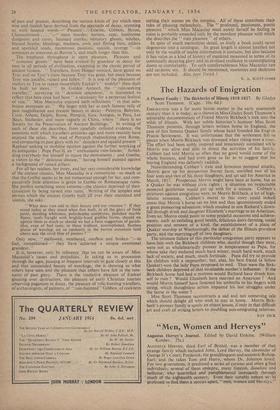The Hazards of Emigration
A Pioneer Family : The Birkbecks of Illinois 1818-1827. By Gladys Scott Thomson. (Cape. 10s. 6d.)
EMIGRATI01•1 was a far more heroic matter in the early nineteenth century than it is today, as is shown in Miss Gladys Scott Thomson's admirable documentation of Friend Morris Birkbeck's trek into the wilds of Illinois. With her subtle historian's humour Miss Scott Thomson presents, through letters written home to England, the case of this famous Quaker family whose head founded the English Prairie Settlement. It was unfortunate that the settlement fell to pieces when Morris Birkbeck was drowned when riding over a river. The effort had been nobly inspired and tenaciously sustained whie Morris was alive and able to direct the activities of his fam ly. Cobbett had told Morris so often that no good would come of the whole business, and had even gone so far as to suggest that his leaving England was definitely caddish. Notwithstanding Cobbett's irate and ferocious personal attacks, Morris gave up his prosperous Surrey farm, enrolled two of his four sons and two of his three daughters, and set sail for America in March, 1817. Prosperous Morris might have been at home, but as a Quaker he was without civic rights ; a situation no respectable moneyed gentleman would put up with for a minute. Cobbett's strictures against emigration were, to Morris Birkbeck, a lot of high- falutin nonsense. Cobbett's moral to this story could indeell stress that Morris's horse sat on him and thus ignominiously ended a great pioneering adventure, which resulted in son Richard's down- fall through drink and daughter Elizabeth's marriage to an American. Even so, Morris could point to some prideful occasions and achieve- ments, such as unfailing good health, felicitous dairy-farming, social position and renown of a kind, the establishment of a place of Quaker worship at Wanborough, the defeat of the Illinois pro-slave party, and the marrying-off of two daughters. The ultimate failure of this particular emigration party appears to have lain with the Birkbeck children who, dutiful though they were, were not as wholeheartedly pioneer in temperament as Papa, for whose sake they endured much hard winter, much hard work, much lack of society, and much, much fortitude. Papa did try to provide his children with a stepmother, but, alas, his best friend (a fellow Quaker) won the lady- Papa proposed to wed. Thus were the Birk- beck children deprived of that invaluable mother's influence. If the Birkbeck home had had a mistress would Richard have drunk him- self to ruin ? Would Elizabeth have married an American ? And would Morris himself have fastened his umbrella to his fingers with string, which thoughtless action impaired his last struggles under the horse in the water ?
Miss Scott Thomson reconstructs a sad and not unmoving tale which should delight all who wish to stay at home. Morris Birk- beck's pioneer family is surely an object lesson, if only in that difficult art and craft of writing letters to doubting non-emigrating relatives.
KAY DICK










































 Previous page
Previous page